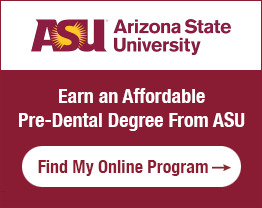The Pennsylvania Department of Labor and Industry reported a total of 8,470 dental hygienists were licensed in the Keystone State as of 2012. The Department projects that by 2022 this number will increase to 9,800, a jump of nearly 16 percent.
The Pennsylvania State Board of Dentistry regulates and licenses both dentists and dental hygienists.
Featured Programs:
- Online
- Online
If you want to work as a dental hygienist in Pennsylvania, you must complete the following steps to qualify for licensure:
Step 1. Graduate from an Accredited Dental Hygiene Program
The Pennsylvania Board of Dentistry requires all applicants for dental hygienist licensure to graduate from a program in dental hygiene accredited by the Commission on Accreditation (CODA) of the American Dental Association (ADA).
Both associate and bachelor-level degree programs in dental hygiene may be accredited, but an associate’s degree meets the minimum requirement for licensure. Associate-level programs may be structured as an A.S., A.A., or A.A.S. degree.
You may, however, choose to complete a bachelor’s degree in dental hygiene if you want to eventually pursue graduate work in this healthcare profession. Bachelor’s degrees may also be the ideal degree program if you want to eventually work in a supervisory or administrative position within a dental practice, or in research or academia.
Dental hygiene programs may be offered through dental schools, junior colleges, traditional four-year universities and colleges, and online distance education institutions. These programs provide a comprehensive education in the general sciences and in the dental sciences, in addition to dental hygiene coursework and clinical training.
In Pennsylvania, there are currently 12 CODA-accredited programs in dental hygiene in addition to a number of online programs available to state residents.
Step 2. Pass the National Board Written Examination
A standard requirement for all state boards of dentistry in the U.S. is the National Board Dental Hygiene Written Examination, through the Joint Commission on National Dental Examinations. The National Board Dental Hygiene examination is designed to assist the State Board of Dentistry in determining your qualifications to practice as a licensed dental hygienist.
You must register to take the examination through the JCNDE, although you will take the examination through one of the Pearson VUE testing centers throughout the U.S. In Pennsylvania, you may take the examination in Harrisburg, Scranton, Lancaster, Allentown, Erie, and Pittsburgh.
Step 3. Pass a Regional Clinical Examination
In addition to taking and passing the National Board Dental Hygiene examination, you must take and pass a clinical (practical) examination to qualify for licensure as a dental hygienist in Pennsylvania.
The State Board of Dentistry allows candidates for licensure to take and pass any one of the following regional examinations to satisfy the clinical examination component for licensure:
- Western Regional Examining Board (WREB)
- Southern Regional Testing Agency (SRTA)
- North East Regional Board (NERB) of Dental Examiners
- Council of Interstate Testing Agencies (CITA)
- Central Regional Dental Testing Services (CRDTS)
Step 4. Apply for a Dental Hygienist License in Pennsylvania
To apply for licensure by examination, you must complete the Application for a License to Practice Dental Hygiene (pages 1 and 2) and submit a check or money order with your completed application in the amount of $75 (made payable to the Commonwealth of PA) to the Board.
Page 3 of the application (Certification of Graduation form) must be completed by the institution where you obtained your dental hygiene degree. The institution must send the completed form directly to the Board office in a sealed envelope.
You must also:
- Request your National Board Dental Hygiene Written Examination score by contacting the JCNDE at 312-440-2678
- Request the regional testing agency to forward your clinical examination score to the Board
- Attach a copy of your CPR certification card to the application
The average processing time for applications is between 10 and 15 days. Once your application has been processed, you may check on the status of your application on the Board’s website.
Step 5. Apply for a Dental Hygiene Local Anesthesia Permit
You may apply for a dental hygiene local anesthesia permit if you completed a CODA-accredited program that included a didactic and clinical course in the administration of local anesthesia or if you completed a CODA-accredited course consisting of a minimum of 30 hours of didactic and clinical instruction.
You must complete the Application for Dental Hygiene Local Anesthesia Permit and send it, along with the application fee of $20 (made payable to the Commonwealth of PA) to the Board.
Your dental hygiene institution must complete the Certification of Education form (page 3) if you completed the local anesthesia program as part of your dental hygiene degree program. You must also attach a copy of your current CPR certification to the application.
Step 6. Apply for Certification as a Public Health Dental Hygiene Practitioner
Public health dental hygiene practitioners in Pennsylvania may perform dental hygiene services in a number of settings, such as correctional facilities, healthcare facilities, public and private educational institutions, personal care homes, and federally qualified health centers, among others.
To practice as a public health dental hygiene practitioner, you must hold certification, which requires you to:
- Hold an active dental hygiene license to practice in Pennsylvania
- Provide the Board with a certification statement (signed by a licensed dentist) that you have completed at least 3,600 hours of practice as a licensed dental hygienist
- Provide the Board with documentation that you have obtained professional liability insurance
You must complete the Application for Certification as a Public Health Dental Hygiene Practitioner and send it to the Board, along with a check or money order for $20 (made payable to the Commonwealth of PA)
Step 7. Maintain your Dental Hygienist License
All dental hygienist licenses expire on March 31 of odd-numbered years. To maintain your license, you must maintain CPR certification (infant, child, and adult) and complete at least 20 continuing education credit hours during each biennial period. The cost of renewal is $40.









